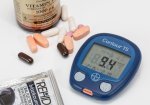Portal Hypertension
Covering portal hypertension diagnosis, symptoms, complications and treatment

Portal hypertension is also known as portal vein hypertension. It is high blood pressure of the portal vein. The portal vein is a vein that collects nutrient rich blood from the intestines to the liver. It is a very important vein in the abdomen that allows the liver to nourish these nutrients for the body's use. Some expects are of the strict view that the portal vein is not a true vein because it does not carry blood directly to the heart but to the liver.
Should the portal vain become blocked or constricted reducing blood flow, blood pressure will increase inside the portal vein. Portal vein hypertension is a form of secondary hypertension because its causes are known. High blood pressure whose causes are unknown is classified as primary hypertension. This is the most common class of hypertension affecting over 90 percent of all high blood pressure sufferers.
The most common cause of portal high blood pressure is cirrhosis. Cirrhosis is in turn a consequence of chronic liver disease. It occurs when liver tissue is replaced by fibrosis, scar tissue and regenerative modules. Cirrhosis is most commonly a result of alcoholism, hepatitis B and C amongst other possible causes. Another cause of portal hypertension worth mentioning is the clotting resulting in narrowing or blocking blood flow from the liver. Portal high blood pressure is an uncommon disorder that happens mostly in older adults.
Portal Hypertension Symptoms And Complications
There are a host of identifiable symptoms of portal high blood pressure. It can be noted that not all of the following listed symptoms will present at the same time. The onset of the disorder may not necessarily always show specific symptoms that highlight what is happening in the liver;
- Fluid build-up in the abdomen
- Weight loss
- Yellowing of skin - jaundice
- Enlarged liver
- Internal hemorrhoids
In terms of portal hypertension complications, varices can rapture or burst at the place where the esophagus and the stomach join. Patients can vomit blood due to bleeding from the varices. This is a major cause of death in individuals with portal high blood pressure. Fluid build-up in the abdomen or ascities can result in kidney failure. The body may detour blood using veins along the rectum, the lowest portion of the colon resulting in them enlarging. This may lead to rapture and massive bleeding from the rectum or anus.
Ascities can lead to a sensation of being full when eating leading to malnutrition. Individuals with ascities find it difficult to be active due to the fluid weight and big abdomen. This complication will also leave one not only with a protruding or swollen stomach but also with thin legs and arms as a result of liver disease and malnutrition.
Portal Hypertension Diagnosis And Treatment
Doctors can use CT, MRI and ultrasound to detect signs of portal high blood pressure for example varices and enlargement of the spleen. Admittedly, diagnosing an individual of portal vein hypertension is not simple. There is a huge difference with measuring whole body hypertension which only needs a blood pressure monitor.
Signs and symptoms of portal vein hypertension are very important to doctors for diagnosis purposes. Tests involving imaging and lab tests can check for cirrhosis which can further be confirmed using liver biopsy. In terms of portal vein hypertension treatment, an individual with ascities will require that steps be taken to drain the abdominal fluid and to keep under close watch the kidneys and liver. Without any improvement death can occur in a few weeks.
Use of pharmacological drugs such as beta-blockers is common. Beta-blockers particularly improve blood pressure and heart function. Beta-blockers also reduce blood flow into the portal vein system and decrease pressure. They also reduce varices bleeding. Hypertension medications such as beta-blockers have side effects and parameters of use which patients will need to be aware of. Blood pressure medication side effects are a dread for some patients.
Procedures such as endoscopic variceal sclerotherapy (EVS) are also used. This particular therapy stops varices bleeding by sealing the bleeding. Other treatments of portal vein hypertension will include surgical shunting. Liver transplant is also another method of treatment even though it is expensive, waiting list very long and the patient will need life long medication.

Return to High Blood Pressure Causes from Portal Hypertension
Return to High Blood Pressure Home from Portal Hypertension
Disclaimer
Information contained on this website is not meant to replace your doctor's advice.
(c) All Rights Reserved. 2010-2018











